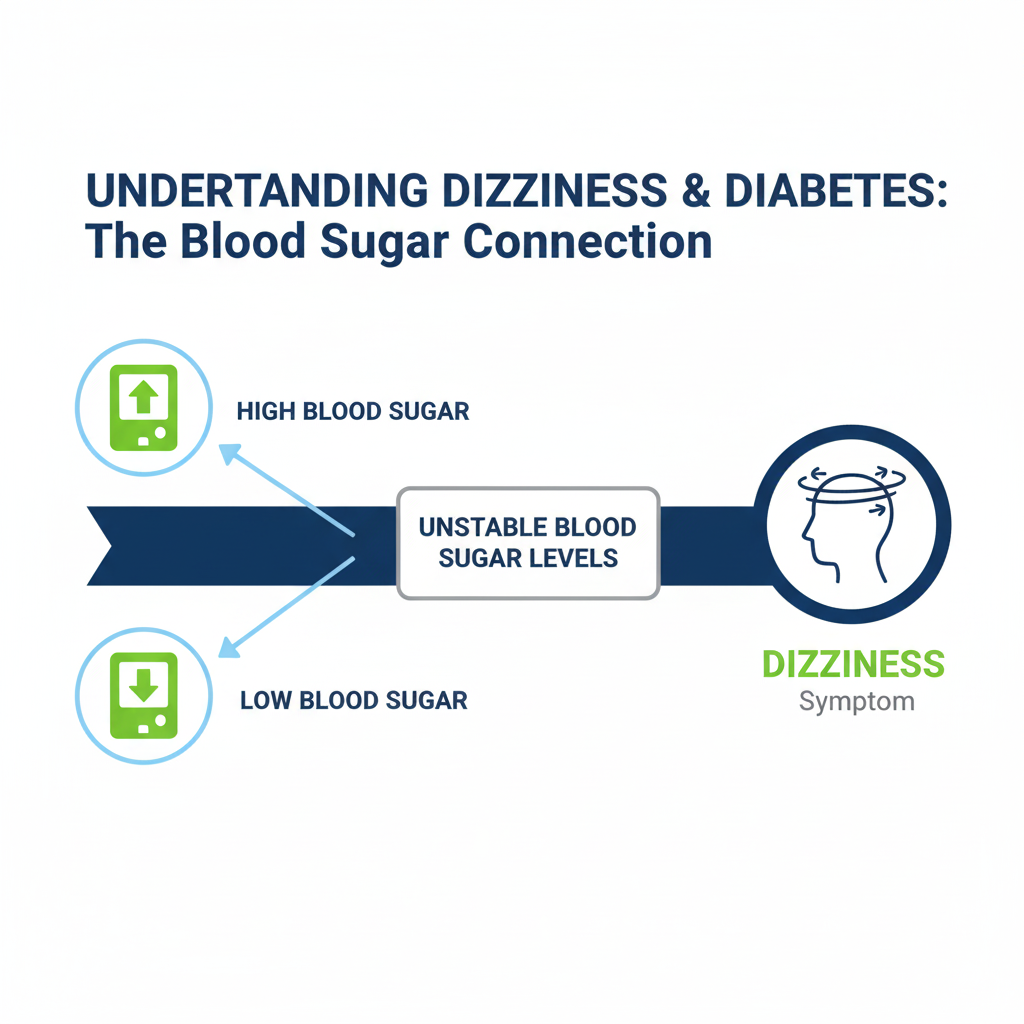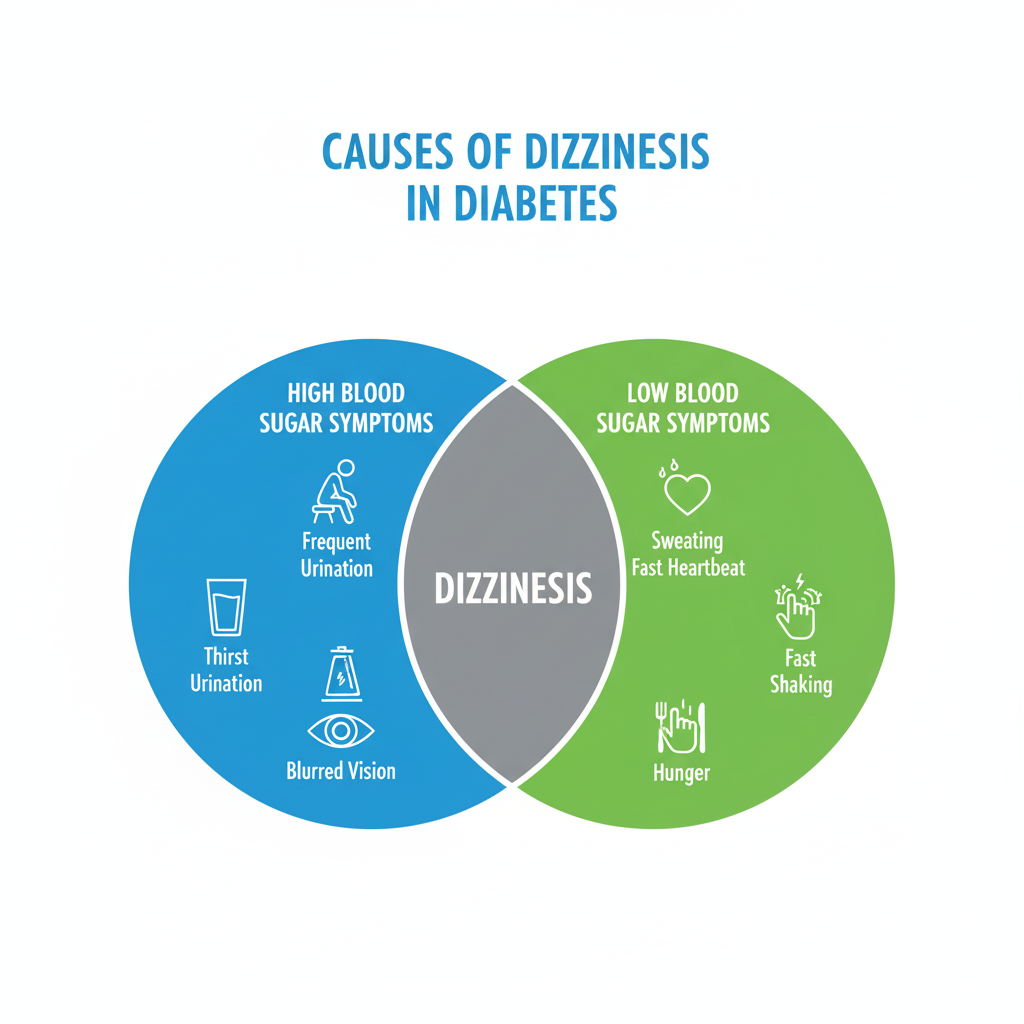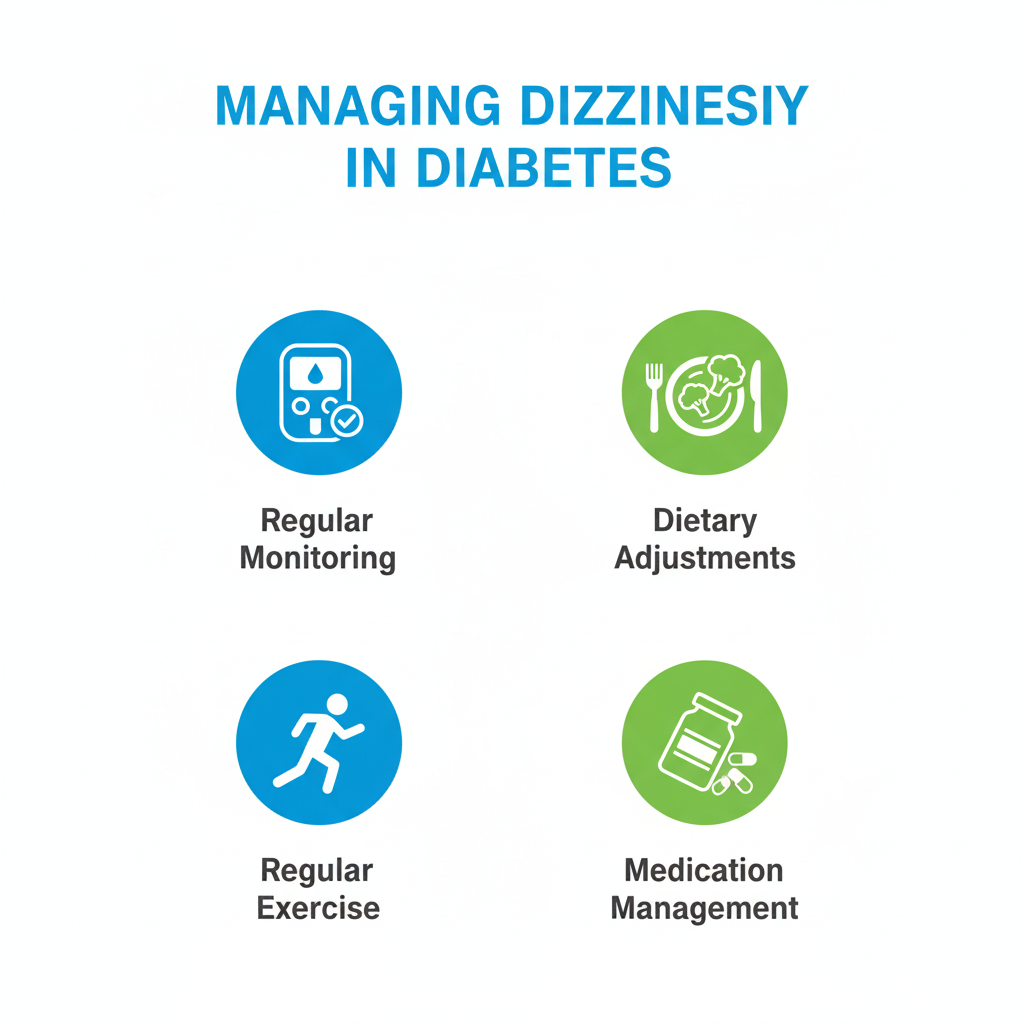Most people know about the main diabetes symptoms. These include feeling tired, being thirsty all the time, and going to the bathroom often. But dizziness is another important symptom that many people experience. You need to know about this symptom and what it means for your health.

Overview of Diabetes
Diabetes happens when your body has too much sugar in the blood for a long time. There are two main types. Type 1 diabetes occurs when your body attacks the cells that make insulin. Type 2 diabetes usually happens because of how you live and your body not using insulin well. Both types need careful care to prevent problems.
Why Dizziness Matters
Dizziness is important because it can show that your blood sugar is changing quickly. This might happen before serious problems like diabetic ketoacidosis or very low blood sugar shock. When you notice dizziness, you can act fast and stop your health from getting worse.
Understanding the Connection
Diabetes and dizziness connect through unstable blood sugar levels. High blood sugar and low blood sugar can both mess up your balance. This makes you feel dizzy. Anyone with diabetes should know that dizziness might mean their glucose levels are not stable.
Causes of Dizziness in Diabetics
Knowing why dizziness happens in diabetes patients helps with prevention and treatment. Several things can cause this feeling. Often it signals that something is not balanced in your body.

The Impact of High Blood Sugar Levels
High blood sugar can make you dehydrated, which causes dizziness. When glucose levels go up, your body tries to get rid of extra sugar by making you urinate more. This can lower your fluid levels and make you dizzy.
Symptoms of High Blood Sugar:
- Being very thirsty
- Going to the bathroom a lot
- Feeling tired
- Blurred vision
Low Blood Sugar and Its Effects
Low blood sugar often causes dizziness because your brain does not get enough glucose. Your brain needs glucose for energy. When it drops, you might feel confused, lose coordination, and get dizzy.
Symptoms of Low Blood Sugar:
- Sweating
- Fast heartbeat
- Shaking
- Hunger
- Trouble thinking clearly
Dehydration and Other Factors
Dehydration from high blood sugar makes dizziness worse in diabetics. Other things like medication side effects, standing up too fast, and being sick can also make dizziness stronger.
Symptoms Accompanying Dizziness in Diabetes
Knowing the other symptoms that come with dizziness helps diagnose the problem. This helps tell the difference between high and low blood sugar and guides treatment.
Recognizing High Blood Sugar Symptoms
High blood sugar causes several clear and subtle symptoms. Knowing these can help prevent serious complications.
Visual Signs: Blurred vision
Physical Signs: Dry mouth, flushed skin, extreme tiredness
Behavioral Signs: More irritability or confusion
Identifying Low Blood Sugar Signs
Knowing low blood sugar signs is just as important. Without treatment, problems like dizziness get worse.
Visible Symptoms: Pale skin, sweating
Internal Signs: Fast heartbeat, hunger
Mental Effects: Confusion, trouble focusing
%20(1).png)
When to Consider Medical Advice
You should see a healthcare provider when dizziness is severe or happens often. Long-lasting or severe dizziness needs medical check-up to prevent falls or other injuries.
Understanding dizziness with diabetes is key for managing your disease well. With the right knowledge and strategies, people with diabetes can handle their condition confidently. They can reduce symptoms and maintain a balanced lifestyle. When you are not sure, talking to a healthcare professional is always smart.
Keep reading to learn practical ways to manage and prevent dizziness in diabetes patients. More insights will help you understand how to stay healthy while living with diabetes.
Managing Dizziness in Diabetes
Regular Monitoring of Blood Sugar
Checking your blood sugar regularly is crucial if you have diabetes and experience dizziness. Use a glucometer to test your blood sugar at different times during the day. Regular checks help you see patterns and triggers that might cause dizziness. You might notice unexpected spikes or drops in glucose levels. By watching these patterns closely, you can change your lifestyle, diet, and medication. This helps keep blood sugar levels more stable and reduces dizziness risk.

DrMorepenHome offers glucometers and test strips that give accurate readings. This makes it easier for you to stay on top of your blood sugar management.
Dietary Adjustments to Prevent Fluctuations
A balanced diet is essential for managing diabetes and symptoms like dizziness. Here are dietary changes that may help prevent blood sugar swings:
Small, Frequent Meals: Eat smaller meals more often instead of large ones. This helps keep blood sugar steady throughout the day.
Watch Your Carbs: Pay attention to carbohydrate intake since carbs directly affect blood sugar. Choose whole grains over refined carbs. They release glucose more slowly.
Balanced Diet: Include proteins, healthy fats, and fiber to slow glucose absorption. This maintains steady sugar levels.
Stay Hydrated: Drink plenty of water. Dehydration can make dizziness worse and affect glucose levels.
Making smart choices about what and how you eat can manage dizziness effectively. You can enjoy a more balanced lifestyle. Consider talking with a nutritionist or dietitian for advice tailored to your specific needs.
When to Contact a Healthcare Professional
Self-management techniques can greatly reduce dizziness episodes in diabetes. But some situations need professional help. If you have frequent dizziness despite managing diet and monitoring blood sugar, seek medical advice. Also get help if dizziness comes with confusion, blurry vision, or chest pain.
A healthcare professional can do detailed assessments to find underlying issues. By booking an appointment, you can address what contributes to dizziness. They may adjust your medication or recommend additional tests to find other potential causes. Keep open communication with your healthcare provider to address these concerns quickly and effectively.
.png)
Preventive Measures for Diabetic Dizziness
Staying Hydrated and Its Importance
Keeping properly hydrated is important for everyone. It is especially important for people managing diabetes. Dehydration can cause and worsen dizziness. It also affects blood sugar levels.
Daily Water Intake: Try to drink at least 8-10 glasses of water daily. Your needs might change based on how active you are, the weather, and your overall health.
Avoid Diuretics: Be careful with drinks that can dehydrate you. This includes drinks with caffeine or alcohol.
By focusing on hydration, you can support better body function and reduce dehydration-related dizziness.
Regular Exercise and Its Benefits
Regular physical activity can greatly improve blood sugar control. This helps prevent symptoms like dizziness:
Better Insulin Use: Exercise helps your cells use insulin more efficiently. This reduces blood sugar levels over time.
Better Circulation: Physical activity boosts blood flow. This can help reduce dizziness.
Stable Energy: Exercise can help stabilize your energy levels. This provides more consistent glucose for your brain.
Do at least 150 minutes of moderate exercise each week. Good activities include brisk walking, cycling, or swimming. Adding strength training exercises twice a week supports even better health outcomes.
Medication Management Tips
Proper management of diabetic medication is critical for stable blood sugar levels and preventing dizziness. Here are key tips:
Follow Prescriptions Carefully: Always take medications as your healthcare provider prescribes. Never change the dose without talking to them first.
Know Medication Effects: Learn about your medications' potential side effects. Some may contribute to dizziness. Discuss these with your doctor.
Regular Check-Ups: Go to scheduled appointments with your healthcare provider. Review how well your current medication plan works and make necessary changes.
By staying informed and engaged in your health management, you can effectively reduce and prevent diabetes-related dizziness.
These strategies offer valuable insights into how lifestyle changes can help manage diabetes and symptoms like dizziness. By following these guidelines, people can lead healthier, more balanced lives. They stay empowered and informed in their diabetes journey. DrMorepenHome supports you with quality health solutions and expert advice for your needs.
Conclusion
Managing diabetes means understanding the complex relationship between blood sugar levels and symptoms like dizziness. This symptom serves as an important indicator that can help prevent more serious diabetes complications. Through regular monitoring, dietary care, exercise, and proper medication, people can take control of their health effectively.
At DrMorepenHome, we help empower you with the information and tools needed to manage your diabetes well. This is more than just managing a condition. It is about enhancing your quality of life. By staying informed, making mindful choices, and maintaining a consistent routine, you can manage diabetes while minimizing discomfort and risks. If dizziness or other symptoms continue, reach out to healthcare professionals for guidance. Your health journey is important. With the right support, it can be manageable and fulfilling.
Frequently Asked Questions
Can dizziness be the first sign of diabetes?
Yes, dizziness can sometimes be one of the first signs of diabetes. This often happens due to changes in blood sugar levels. Early detection and management can prevent complications. If you often experience dizziness along with other symptoms like increased thirst or frequent urination, talk to a healthcare provider.
How can you tell if dizziness is related to blood sugar?
Blood sugar-related dizziness often comes with other symptoms. If your dizziness happens with sweating, confusion, shaking, or headaches, it may mean low blood sugar. If you experience nausea, blurred vision, or fatigue, high blood sugar might be the cause. Check your blood sugar levels when dizziness occurs. This can help pinpoint the underlying issue.
What should I do if I experience frequent dizziness?
Do not ignore frequent dizziness as it may signal a blood sugar imbalance. Start by keeping a record of when dizziness occurs and any other symptoms. Check your blood sugar regularly and maintain a balanced diet. If dizziness continues, talking to a healthcare professional is crucial. They can identify the cause and adjust your diabetes management plan.
How can diet adjustments help manage dizziness in diabetes?
Diet plays a vital role in maintaining stable blood sugar levels and preventing dizziness. Include whole foods such as vegetables, lean proteins, and whole grains. Avoid excessive sugar and refined carbs to stabilize glucose levels. Eating smaller, more frequent meals can also prevent the sharp rises and falls in blood sugar that lead to dizziness.
When should I contact a healthcare professional about dizziness?
Talk to a healthcare professional if you experience dizziness frequently despite managing your diet and blood sugar. Also, if dizziness leads to falls, confusion, or severe headaches, seek medical advice promptly. Healthcare providers can evaluate your symptoms and may need to adjust your treatment plan to better meet your health needs.The insights and resources from DrMorepenHome are designed to support you in navigating your diabetes management. They address concerns like dizziness and ensure you have the right tools and knowledge to maintain a healthier lifestyle.
.png)



.png)
.png)
.png)
.png)
.png)
.png)
.png)

.png)
.png)
.png)

.png)
.png)
.png)
.png)
.png)
.png)

.png)
.png)

.png)
.png)
.png)

.png)

.png)


.png)







